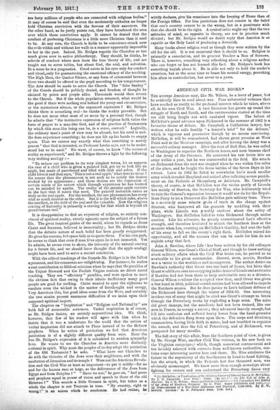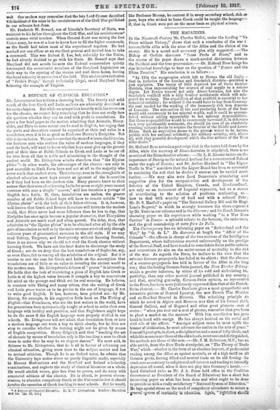AMERICAN CIVIL WAR BOOKS.* Tax average American may, like Mr.
Wilson, be a lover of peace, but he evidently likes to read about war. Four substantial volumes that have reached us testify to the profound interest which he takes, above all, in his own Civil War. A vast literature has grown up round the struggle of North and South. and the controversies started at the time are still being fought out with unabated vigour. The failure of McClellan's grand advance upon Richmond in the summer of 1862 is a favourite theme of debate. Mr. Campbell, a Californian lawyer, has written what he calls frankly " a lawyer's brief " for the defence.'
which is vigorous and persuasive though by no means convincing.
McClellan, it will be remembered, had shown great promise at West Point and in the Mexican campaign, and after leaving the Army was a successful railway manager. After the rout of Bull Run, he was called to Washington to organize the Northern forces, and soon became chief of the Army of the Potomac. He converted his raw levies into an
army within a year, but he was unsuccessful in the field. His attack
on Richmond from the east was stopped when ho was within five miles of the place, and ho fought the fierce battles of the Seven Days in his retreat. Later in 1862 ho failed to overwhelm Lee's much smaller army which invaded Maryland and retired after inflicting severe punish- ment on the Federals at Sharpsburg or Antietam. Mr. Campbell's theory, of course, is that McClellan was the victim partly of Lincoln but mainly of Stanton, the Secretary for War, who deliberately tried to ruin the General's reputation because it would not do for the Repub- lican Party to let a Democrat like McClellan gain military fame. There is conceivably some minute grain of truth in the charge against Stanton, who hampered all the generals by meddling with their plans, while Lincoln was pasably anzioua about the safety of Washington. But McClellan failed to take Richmond through undue caution. Like his advocate, ho greatly overestimated Lee's effective strength, and therefore hesitated to attack the Southern lines at the moment when Lee, counting on McClellan's timidity, had sent the bulk of his army to fall on the enemy's right flank. McClellan missed his opportunity, and all the excuses that can be made for him do not explain away that fact.
John A. Rawlins, whose Life = has been written by his old colleague General Wilson, was Grant's Chief of Staff, and though he knew nothing about military affairs when the Civil War broke out, ho proved to bo nvalu able to his great commander. Shrewd, stern, ascetic, Rawlins was a terror to the worthless and incompetent. The author denies on Rawlins's authority that Grant was too fond of liquor, but hints that Grant would have wen too easygoing in his choice of friends and assistants if Rawlins had not been there to keep undesirable men at a distance.
General Wilson confirms the accepted view that, until Grant was given
a free hand in 1864, political considerations had been allowed to impede the Northern armies. But he does justice to Loo's brilliant defence of the Richmond lines through the winter of 1864-63. One interesting incident out of many that might be cited was Grant's attempt to break through the Petersburg works by exploding a huge mine. The mine did great damage, but the assailants had not been trained, like our men in France, to occupy a crater they advanced bravely enough, but fell into confusion and suffered heavy losses from the hand-grenades which the defenders flung down upon them. The corps and divisional commanders, having little faith in mines, had not troubled to organize the assault, and thus the fall of Petersburg, and of Richmond, was postponed for many menthe.
The full story of this affair, from the Southern point of view, is given by Mr. George Wise, another Civil War veteran, in his new book on tho Virginian campaigns; which, though somewhat controversial and too lavishly adorned with extracts from well-known authorities, con- tains some interesting matter here and there. Mr. Wise attributes the failure to the superiority of the Southerners in hand-to-hand fighting, but the attack, in which the Federals lost five thousand men, was obviously mismanaged. We know more than enough nowadays about fighting for craters and can understand the Petersburg fiasco very
• (1) McClellan : a Vindication of the Military Career of General George B. McClellan. By J. 11. Campbell. New York : Neale. l$ The We of John A. Marlins. By J. LI. Wilson. Same puLlislims and prlee.--(2) Caimans= and &aka of the Army of Northern Virginia. By G. Wise. Sams publishers. nd price.— (4) Reminiscences of a War4isms Statesman and Deploccal. 1830-1915. Dr F. W.
Seward. London : Y. Pcitustais boas. LISs. nett well Our readers may remember that the late Lord Cromer described this incident of the mine in his reminiscences of the Civil War published in our columns last June.
Mr. Frederick W. Seward, son of Lincoln's Secretary of State, was assistant to his father throughout the Civil War, and his reminiscences' contain some vivid touches. When General Scott was raising the first Union army, he was at a loss to know how to 811 the higher commands, as the South had taken most of the experienced regulars. He had marked out one officer as an excellent general and invited him to take a command. This was Robert E. Lee, but, unluckily for the Union, he bad already deckled to go with his State. Mr. Seward says that Maryland did not accede because the Federal commanders quietly intercepted the secessionist members of the Maryland Legislature on their way to the.opening of the session and sent them home, leaving the loyal minority in possession of the field. This unobtrusive imitation of " Pride's Purge," though technically illegal, saved Maryland from following the example of Virginia.



































 Previous page
Previous page